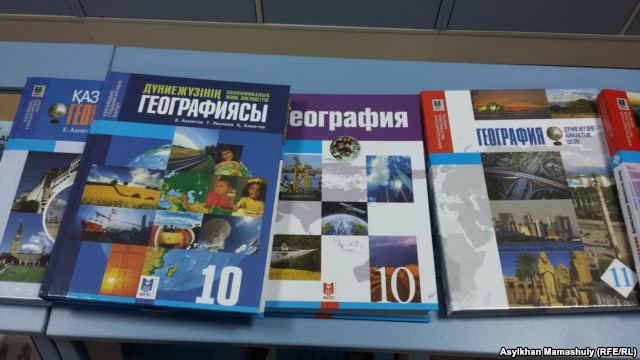 Kazakhstan’s diplomatic balancing act over the conflict in Ukraine has been upset by a fresh row about the status of the Russia-annexed Crimean Peninsula.
Kazakhstan’s diplomatic balancing act over the conflict in Ukraine has been upset by a fresh row about the status of the Russia-annexed Crimean Peninsula.
Ukraine’s embassy in Astana on September 25 addressed a note of protest to Kazakhstan’s Foreign Ministry over school textbooks that show Crimea — which most of the international community, including Kazakhstan, recognizes as part of Ukraine — as belonging to Russia.
The information in the textbooks “contradicts the position of the international community and the leadership of the Republic of Kazakhstan, which has more than once stated its support for Ukraine’s territorial integrity,” the embassy said in its statement.
Only a handful of countries, including North Korea, Cuba, Syria and Venezuela, have recognized Crimea as part of Russia. Other members of the international community — even usually staunch Moscow allies, like Belarus — insist the territory should be handed back to Ukraine.
Kiev has asked Kazakhstan’s Foreign Ministry and Education and Science Ministry to work toward “the immediate recall of these textbooks from secondary schools,” the embassy statement said. No response was immediately forthcoming.
The Ukrainian embassy’s contacts with Mektep, the publishing house that put out the offending textbooks, “testified that, unfortunately, a certain part of Kazakhstani society is deeply infected by Russian propaganda,” the statement said.
It urged action to boost Kazakhstan’s information security by restricting broadcasting of Russian television channels, which are beamed into homes all across Kazakhstan and play a large public opinion-forming role.
The row will prove embarrassing to the administration of President Nursultan Nazarbayev. Kazakhstan has sought to avoid antagonizing Russia while also striving to refrain from condoning Russian encroachments on territorial integrity, such as last year’s annexation of Crimea.
The land grab and Russia’s argument that it has the right to intervene in foreign countries to protect Russian speakers abroad have caused sleepless nights in Astana, particularly in the light of aggressive territorial claims on northern Kazakhstan voiced by nationalist politicians in Moscow.
Like Ukraine, Kazakhstan shares a long border with Russia and is home to a large ethnic Russian minority, which accounts for around 21 percent of the population. Nazarbayev has always embraced inclusive ethnic policies, but has gone out of his way to assure minorities that their rights are protected since conflict broke out in Ukraine.
He has also personally expressed support for Ukraine’s territorial integrity.
“The fact that we support each other over our territorial integrity and independence is very important for our two countries,” Ukrainian Prime Minister Arseniy Yatsenyuk told Nazarbayev at a meeting in Kyiv last December.
“That’s quite right,” Nazarbayev responded. “And we are ready to continue this work.”
Kazakhstan is currently in the midst of celebrations marking the 550th anniversary of Kazakh statehood, which were announced shortly after Russian President Vladimir Putin had appeared to cast doubt on the country’s future viability as a nation state.
EurasiaNet.Org, 25.09.2015




